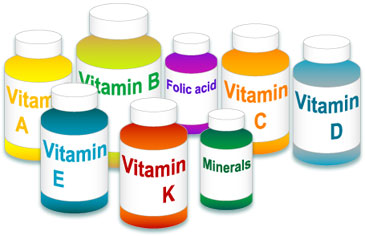EAT YOUR VITAMINS
VITAMIN TIME: HEALTH SERIES
I get a lot of questions about vitamins. How to use them, when to use them, how often I should use them? I distinctly chose the word use instead of take because in essence, that’s what we do with vitamins. We use them. Daily! Not just in the supplements we purchase, but in the foods we consume. The problem is that not all foods contain vitamins or nutrients that we need and people make poor decision with what they eat on a daily basis. Therefore, it is quite possible to eat 3-4000 calories a day and still miss the recommended daily value of vitamins that the body needs to perform at an optimal level.
People underestimate the importance of vitamins and the role they play in the functioning of the body. Vitamins are essential substances that must be consumed because the body is unable to manufacture them. They are required to maintain health and normal body functions and to prevent the diseases that result from consuming insufficient amounts. So with that being said, I decided to begin a series devoted specifically to vitamins and the many benefits they have on the human body. Now, you will be empowered with information to wield as a weapon against the free radicals and junk food substances that seek to complete your demise, making you feel sluggish, unattractive and slow as molasses. Who goes to the gym when you feel like that?
First up on the list: Vitamins A and C – **I skipped B because it needs a blog all to itself because of its many different forms.
- Vitamin A
Vitamin A prevents eye problems, promotes a healthy immune system, is essential for the growth and development of cells, and keeps the skin healthy.
Good sources of vitamin A are milk, eggs, liver, fortified cereals, dark colored orange or green vegetables (such as carrots, sweet potatoes, pumpkin, and kale), and orange colored fruits such as cantaloupe, apricots, peaches, papayas, and mangos. Teenage boys need 900 micrograms of vitamin A each day and teenage girls need 700 micrograms each day.
Optimal Intake: The current recommended intake of vitamin A is 5,000 IU for men and 4,000 IU for women. Many breakfast cereals, juices, dairy products, and other foods are fortified with vitamin A. Many fruits and vegetables, and some supplements, also contain beta-carotene and other vitamin A precursors which the body can turn into vitamin A.
- Vitamin C
Vitamin C is needed to form collagen, a tissue that helps to hold cells together. It is essential for healthy bones, teeth, gums, and blood vessels. It helps the body absorb iron and calcium, aids in wound healing, and contributes to brain function. You will find high levels of vitamin C in red berries, kiwifruit, red and green bell peppers, tomatoes, broccoli, spinach, and juices made from guava, grapefruit, and orange. Teenage boys need 75 mg (milligrams; 1 milligram equals 1,000 micrograms) and teenage girls need 65 mg of vitamin C a day.
Optimal Intake: The current recommended dietary intake for vitamin C is 90 mg for men and 75 mg for women (add an extra 35 mg for smokers). There’s no good evidence that mega doses of vitamin C improve health. As the evidence continues to unfold, 200 to 300 mg of vitamin C a day appears to be a good target. This is easy to hit with a good diet and a standard multivitamin. Excellent food sources of vitamin C are citrus fruits or citrus juices, berries, green and red peppers, tomatoes, broccoli, and spinach. Many breakfast cereals are also fortified with vitamin C.
So there you have it, A and C in a nutshell. Come back next time for more Vitamins as I continue the series. Stock up your cabinets, get eating and have a great day!
Categories
Archives
- October 2018
- September 2018
- May 2016
- March 2016
- February 2016
- December 2015
- November 2015
- October 2015
- September 2015
- August 2015
- July 2015
- June 2015
- May 2015
- April 2015
- March 2015
- February 2015
- January 2015
- November 2014
- October 2014
- April 2014
- March 2014
- February 2014
- January 2014
- December 2013
- November 2013
- October 2013
- September 2013
- August 2013
- July 2013
- June 2013
- May 2013
- March 2013
- February 2013
- January 2013
- December 2012
- November 2012
- October 2012
- August 2012
- July 2012
- November 2011

